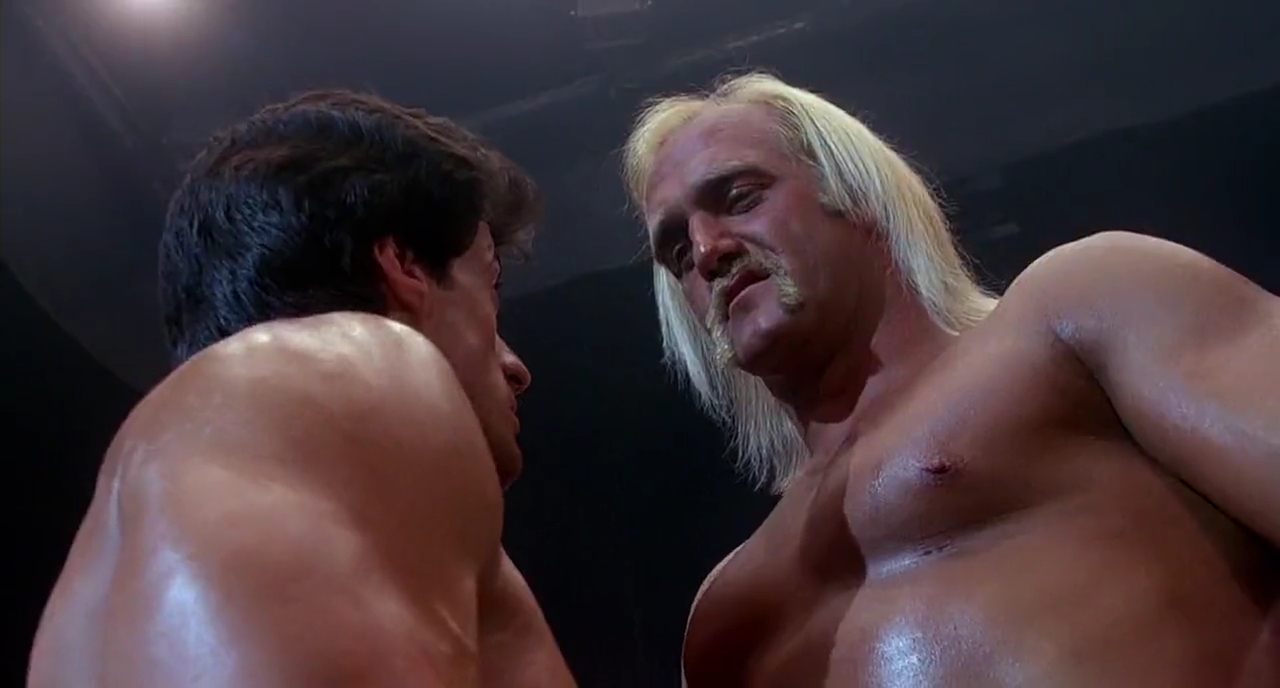For the character of Rocky Balboa, success always seemed miles away. Struggling to make it through on a daily basis on the urban streets was never an easy task. His sluggish yet innocent personality made him an obvious target to individuals who wanted to take advantage of him. For all that, everything would change when he went toe-to-toe (twice) with the latest heavyweight boxing champion Apollo Creed. Even after the first fight, Rocky had become nothing short of legend. As for the rematch, it was what solidified his image as the rising star that he was. Rocky (1976) and Rocky II (1979) are the two films that book-ended this story so nicely. Of course there would be a continuation that would be in the form of this feature but did it maintain the same level of quality? It’s there, but not as much. It's still a well-made and captivating entry but it lacks the substance that made the first two so gratifying to see.
 |
| We all wanted to see this,...but it wasn't necessary |
The film begins like it did with its first sequel by recapping the finale of its predecessor and showing how much of a beating Rocky could really take. After winning the title, Rocky then becomes engrossed in his fame by covering promo ads, photo shoots, celebrity show cameos and interviews. Despite this, Rocky ends up confronting a new opponent named Clubber Lang (Mr. T) and discovers he may not be as prepared as he thought, so Apollo Creed returns to get Rocky in shape one last time. As for Stallone's direction on how he wanted Rocky to develop as a character, the idea was absolutely fine. When someone becomes famous and is offered riches beyond their imagination, who wouldn't indulge? The lesson behind it all is that you can't let your guard down, no matter how comfortable you feel. Nonetheless, Stallone's writing misfires a number of times in compensation for his directing.
The problems in the screenplay are that unlike its forerunners, there are a couple of scenes that do not add any meaning to the story at hand. Right at the start, Rocky has to confront his Brother-in-law Pauly (Burt Young) about his reckless behavior. Turns out that Pauly is jealous over Rocky's fame, yet the matter is resolved all within the same scene. Another is the charity match between Rocky and Thunderlips (Hulk Hogan). There's nothing wrong with this match up; who wouldn't want to see it? But the fact that it did not move the plot a long in any way other than for the spectacle of Hogan Vs Stallone had no use. These kinds of instances are wasteful. Meanwhile, the audience could have had more sentimental scenes between Rocky and his family. That's not the case though. The audience barely views any family time between Rocky, his wife Adrian and young son.
Instead, fans see Pauly constantly complaining and Adrian saying almost nothing important until close to the final act. Along with developing Rocky and his family, his opponent Clubber Lang receives little treatment either. It's hard to say if Clubber Lang's personality is actually Mr. T being himself or not. It's also another thing when a character is determined by something, but Lang doesn't seem to have a reason. Lang has hatred so strong that there's got to be more of a motive than just Rocky ignoring his demands for a match. No one holds that much resentment for a reason like that. Lang really just appears to be fuming out of nowhere for very little reason. Burgess Meredith as Mickey, Carl Weathers as Apollo Creed and Tony Burton as Creed's coach were really the only true redeeming character additions. Meredith is able to provide a touching scene with Rocky and seeing Creed and his former coach team up with Rocky is also a plus. This particular element helps humanize Creed and his followers and makes them even more likable as characters.
 |
| Play nice boys |
The other remaining components that do work like before were the music and match fights. The way the fights are choreographed still have life in them and keep the sequences moving at a brisk pace as if to emulate how fast the fists are flying. Credit also goes to Bill Butler, who also was director of photography for Rocky II (1979) and Jaws (1975). Also, because this film represents how far Rocky drifted from his original life (living style), numerous shots contain everything from floor to ceiling of glam and riches galore. It's definitely flashy and displays how much wealth Rocky acquired but it's all style over substance (as explained before). The music composed again by Bill Conti did another efficient job. This time when it came to contemporary music of the time, "Eye of the Tiger" is emphasized more than anything else. "Gonna Fly Now" is still in there but "Eye of the Tiger" was given more priority. The Rocky theme is still played throughout as well along with the softer moments that occur. It's still a decent movie but wasn't executed entirely right.
Sylvester Stallone had the right idea on how to continue Rocky's story but his screenplay misses the point by including scenes that go nowhere instead of developing all of its characters like the first two films. Mr. T as Clubber Lang was certainly the right choice for an antagonist but he too barely has much depth. The music and fight sequences all still please to a point with Carl Weathers returning but without all of its developed characters, the heart of the story doesn't feel as strong.
Points Earned --> 6:10


No comments:
Post a Comment